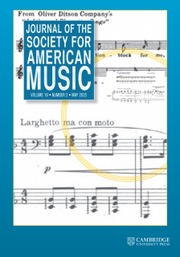No CrossRef data available.
Article contents
Celebrating the Nation: Kurt Weill, Paul Green, and the Federal Theatre Project (1937)
Published online by Cambridge University Press: 13 July 2011
Abstract
In summer 1937, the Federal Theatre Project (FTP) commissioned from playwright Paul Green and composer Kurt Weill a work to celebrate the 150th anniversary of the adoption of the U.S. Constitution. Green had provided the text for Weill's first American musical play, Johnny Johnson (1936), which the FTP took up with some enthusiasm, and he had scored some success with his outdoor historical drama The Lost Colony (1937). He was also interested in music on the stage following his encounters with Russian director Alexei Granowski in Berlin in 1928–29. Weill, in turn, was involved in various spectacle-driven projects in 1937, not least with fellow émigré Max Reinhardt. Green's first scenario for the new drama focused on the constitutional implications of recent labor disputes in the U.S. South. However, the controversy of summer 1937 surrounding the overt agit-prop of Marc Blitzstein's The Cradle Will Rock—sponsored but then dropped by the FTP—put an end to such political aspirations. Green rewrote his outline in favor of a more conventional treatment of the American Revolutionary War, to be called The Common Glory. Although he produced a rough script, and Weill started composing the score, the project collapsed, in part because of their incompatible visions for the play and its music. Nevertheless, newly uncovered sources reveal them attempting to grapple with the potentials of nationalistic subject matter in the theater, and with the search for U.S. cultural identities in changing times.
- Type
- Research Article
- Information
- Copyright
- Copyright © The Society for American Music 2011




